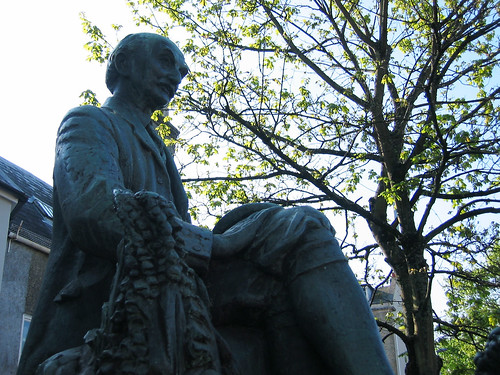
{Photo by rocketlass.}
While reading Barbara Tuchman's The Proud Tower: A Portrait of the World Before the War, 1890-1941 (1966) last week, I was surprised to find that her account of a 1909 English Parliamentary crisis brought in an old I've Been Reading Lately favorite. The crisis came about when the Chancellor of the Exchequer,David Lloyd George, in need of extraordinary new revenue to make good on the Liberal Party's campaign promises while also continuing to build England's new fleet of dreadnoughts, proposed what became known as the People's Budget. The budget was one of the earliest salvos in the slow march of serious taxation on the hereditary holdings of the English nobility, and its proposed taxes on inherited and undeveloped land "aroused the whole of the landowning class in furious resentment, as it was intended to." Tuchman notes,
Lloyd George pressed it home in public mockery and appeals to the populace as blatant as when Mark Antony wept over Caesar's wounds. Personifying the enemy as "the Dukes," he told a working-class audience of four thousand at Limehouse in London's East End, "A fully equipped Duke costs as much to keep up as two Dreadnoughts . . . is just as great a terror and lasts longer."The budget was passed easily by the Liberal-dominated House of Commons, after which it was sent to the House of Lords, which at that point technically still exercised veto power over all legislation.
Traditionally, however, the House of Lords had always allowed finance bills to pass, for reasons that Tuchman explains:
[A]s Lord Salisbury had once pointed out over an earlier budget, there was no constitutional bar to the Lords throwing out a Finance Bill--only a practical one: they could not throw out the Government of the day along with it. To reject a budget and leave the Government in power would amount to deadlock.As a budget, unlike other legislation, is absolutely necessary for the continued running of the government, its rejection by the House of Lords, if followed by the Commons standing strong and refusing to amend the bill, would have left England in an untenable position. The Government's response was to threaten the unthinkable: they would
advise the King to create enough Peers to provide a Liberal majority in the House of Lords, as many as five hundred if necessary, a deluge that would drown the hereditary peerage.The next year saw wrangling and intransigence, followed by a general election that returned a similar majority for the Liberals, after which Prime Minister H. H. Asquith convinced George V to agree, at least in principle, to the creation of the necessary new Liberal Peers--which is where our literary friends unexpectedly enter the picture:
At some undated stage in the proceedings Asquith drew up, or caused to be drawn up, a list of some 250 names for wholesale ennobling, which, though it included Sir Thomas Lipton, did not altogether deserve Lloyd George's sneer about glorified grocers. On the list along with Lipton were Asquith's brother-in-law, H. J. Tennant, as well as his devoted admirer and future biographer, J. A. Spender; also Sir Edgar Speyer, Bertrand Russell, General Baden-Powell, General Sir Ian Hamilton, the jurist Sir Frederick Pollock, the historians Sir George Trevelyan and G. P. Gooch, the South African millionaire Sir Abe Bailey, Gilbert Murray, J. M. Barrie, Thomas Hardy, and Anthony Hope, author of The Prisoner of Zenda.The thought of any of those last three being named to the House of Lords is a definitely amusing, but of course it's Hardy who really caught my eye. It's so hard to imagine the odd, quiet, apolitical country man that Hardy was by the early 1900s being made a Peer--especially for such openly political reasons. I wonder if he would even have accepted the honor? Though Asquith knew him to be a Liberal supporter, following a meeting between the two arranged by Edmund Gosse, Hardy had just a few years earlier shown himself reticent about accepting honors, dithering to the point of stasis about a mere knighthood. As Claire Tomalin describes it,
Mr Asquith, as Prime Minister, offered Hardy a knighthood, an honour Englishmen traditionally accept with the excuse that they are doing so to please their wives. Hardy sent a curious reply to Asquith, expressing his warm admiration for his policies, but saying he would like to think over the proposed knighthood for a year. Although this was politely agreed to, it does not seem to have been brought up again, and Emma remained plain Mrs Hardy.Oddly enough (but in keeping with the difficulties that Emma faced as Hardy's wife--and her tendency to carefully nurse them into thriving grievances), he later accepted the Order of Merit,
a much more distinguished award but one that carried no "Sir" or "Lady." The nearest she got to her wish was that among her Dorset neighbours some of the children called her "Lady Emma" behind her back, in mocking tribute to her sense of her own importance.Thomas, Lord Hardy of Dorset--is that what he would have been had Asquith acted on his plan? And if, as despite my doubts is not impossible to imagine, Hardy had embraced his new role, how might that have changed his later career? Mightn't a public role, with all the renewed attention and even adulation that might have accompanied it, have mitigated the grief occasioned by his Emma's death, which seems to have fueled so much of his subsequent poetry? Is there, in some parallel universe, an aging Hardy who, fat and happy, recites patriotic verse to rapt society audiences on the eve of the Great War?
Lord Hardy of Wessex, maybe?
ReplyDeleteOh, of course! Or of Casterbridge!
ReplyDelete